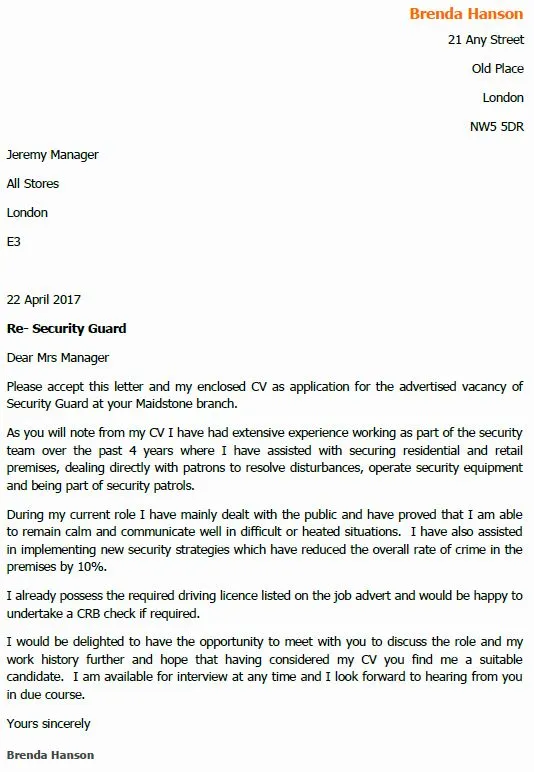Understanding the Security Officer Role
Before you even begin to write your cover letter for a security officer job, it’s crucial to understand the responsibilities and requirements of the role. Security officers are the front line of defense, responsible for protecting people, property, and assets. They deter crime, enforce regulations, and respond to emergencies. Understanding the core duties such as patrolling premises, monitoring surveillance equipment, controlling access, and writing reports will help you tailor your cover letter to showcase your relevant skills and experiences. A well-written cover letter will demonstrate your understanding of these responsibilities and highlight your ability to perform them effectively. This foundational knowledge is key to making a strong impression.
Essential Skills for a Security Officer
A successful security officer possesses a diverse set of skills. These skills go beyond simply being present and include a high level of professionalism, the ability to make quick decisions, and strong communication capabilities. Highlight these essential skills in your cover letter to demonstrate your suitability for the position. Consider how you can showcase these attributes through specific examples from your past experiences. Demonstrate your competence in areas such as conflict resolution, emergency response, and report writing, all essential qualities for any security role.
Communication Skills
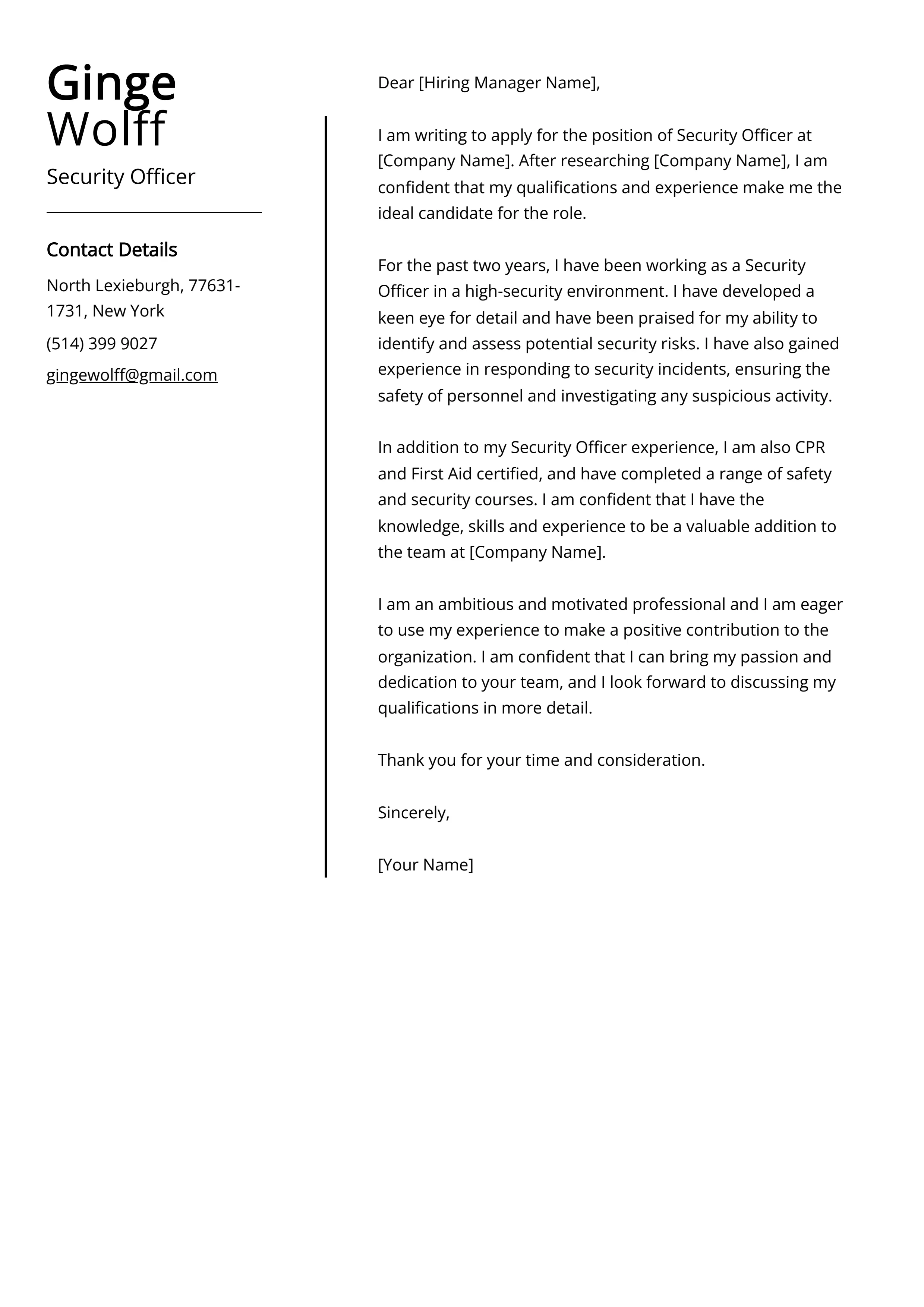
Effective communication is vital for security officers. They must be able to clearly and concisely communicate with colleagues, supervisors, and the public. This includes verbal communication for incident reporting, radio communication, and providing instructions or warnings. Written communication skills are also critical for producing accurate and detailed reports. In your cover letter, provide instances where you’ve effectively communicated in various situations. Mention any training or experience in de-escalation techniques, as this demonstrates an ability to handle sensitive situations with poise and clarity.
Observation Skills
Security officers must have keen observation skills to identify potential threats or suspicious activities. This involves paying close attention to details and recognizing anomalies. In your cover letter, describe any experiences where your observational skills were critical. For example, did you notice something out of place that prevented a security breach or helped to resolve an incident? Showcase your ability to remain vigilant, which is a core aspect of the job. Mention any training or experience with surveillance systems or security monitoring equipment as this indicates a proactive approach to security.
Physical Fitness and Stamina
Security work can be physically demanding, requiring officers to stand for long periods, patrol premises, and respond to emergencies. Physical fitness and stamina are essential. In your cover letter, mention any relevant physical fitness certifications or any activities you participate in that help you maintain your physical readiness. Explain your ability to perform the physical tasks required, emphasizing your commitment to safety. Consider mentioning any self-defense training or experience as this further demonstrates your preparedness.
Writing Your Security Officer Cover Letter
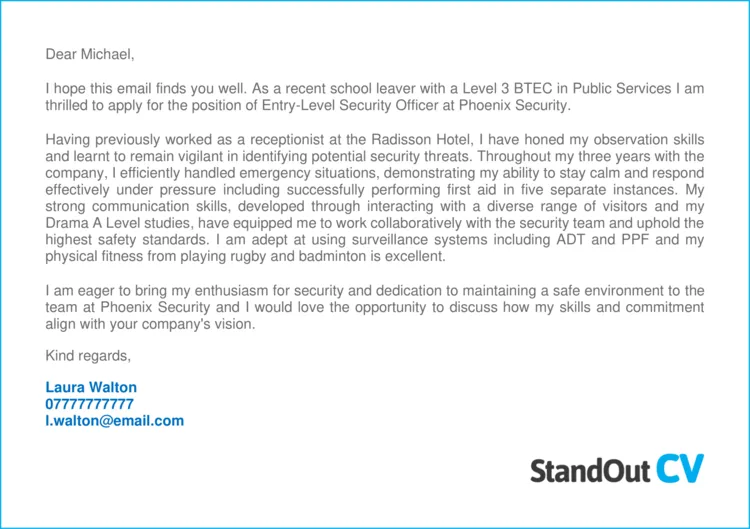
Crafting a compelling cover letter is an art. It’s your first chance to make a positive impression, so take the time to create a personalized, professional document that highlights your relevant skills and experiences. Start by researching the company and tailoring your letter to their specific needs. Use clear and concise language, and always proofread for errors. Use action verbs to showcase your achievements, providing concrete examples to demonstrate your capabilities. Ensure your letter stands out by showcasing your passion for security and your understanding of the role’s responsibilities.
Header and Contact Information
Begin your cover letter with a professional header that includes your name, address, phone number, and email address. Make sure this information is accurate and up-to-date. You should also include the date and the employer’s contact information, such as the hiring manager’s name (if known), their title, and the company’s address. Maintaining a professional format here is very important; use a standard font and layout to enhance readability. Check and double-check the contact details to avoid any delivery issues. The header sets the tone for the rest of the letter, so it should be clean and well-organized.
Greeting and Introduction
Start your letter with a professional greeting such as “Dear Mr./Ms. [Last Name]” or “Dear Hiring Manager.” In your introduction, state the position you are applying for and where you saw the job posting. Briefly introduce yourself and express your interest in the security officer position. Make your opening sentence attention-grabbing and highlight your key qualifications or the value you bring to the role. This is your opportunity to make a strong first impression. Show genuine enthusiasm for the opportunity and mention what you are particularly drawn to about the company or role.
Highlighting Relevant Experience
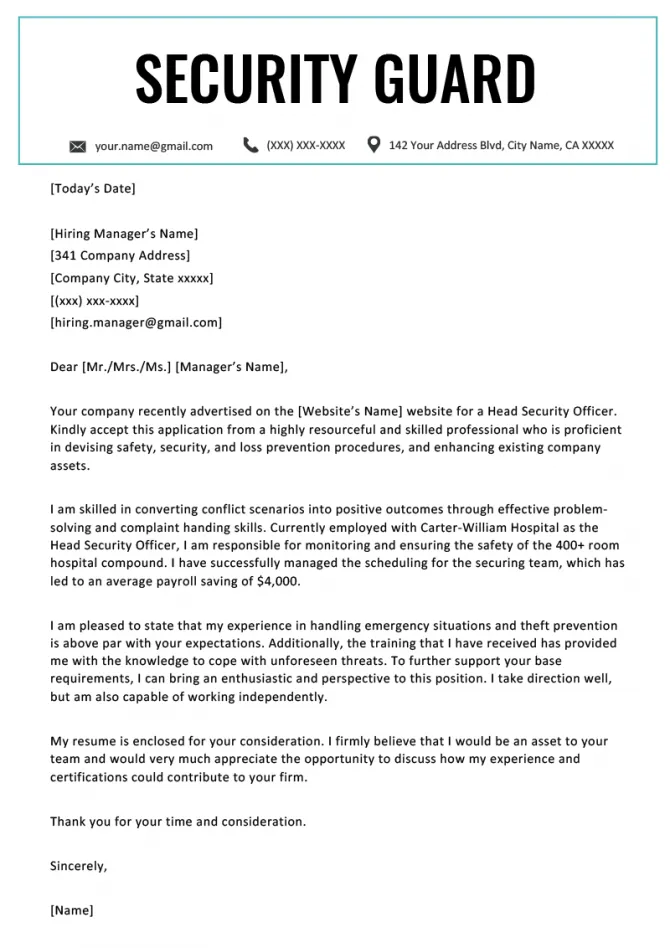
The main body of your cover letter should focus on your relevant experience. Use specific examples to demonstrate your skills and qualifications. Tailor your letter to match the job description, highlighting the skills and experiences the employer is seeking. Clearly describe your past roles and responsibilities, emphasizing those that align with the requirements of the security officer position. The key is to provide tangible proof of your abilities. Quantify your achievements whenever possible to show the impact you made in previous roles.
Quantifying Achievements
Whenever possible, quantify your achievements using numbers and data. This adds credibility to your claims and demonstrates the impact you had in previous roles. Instead of stating that you “improved security protocols,” specify by how much: “Reduced incidents by 15% by implementing new patrol strategies.” This demonstrates a result-oriented approach. Quantifiable achievements make your cover letter much more compelling and show potential employers the value you bring to the table. This detail makes your application stand out from generic ones.
Demonstrating Skills and Qualifications
Clearly outline your skills and qualifications, tying them directly to the job requirements. List relevant certifications, such as a security license, first aid training, or any specialized training. Explain how your skills and qualifications align with the duties and responsibilities of the security officer role. Provide examples of how you’ve used these skills in the past. Make sure your qualifications align with the job description’s requirements. If they mention a specific skill or technology, make sure you incorporate it in your narrative, emphasizing your proficiency.
Addressing the Employer’s Needs
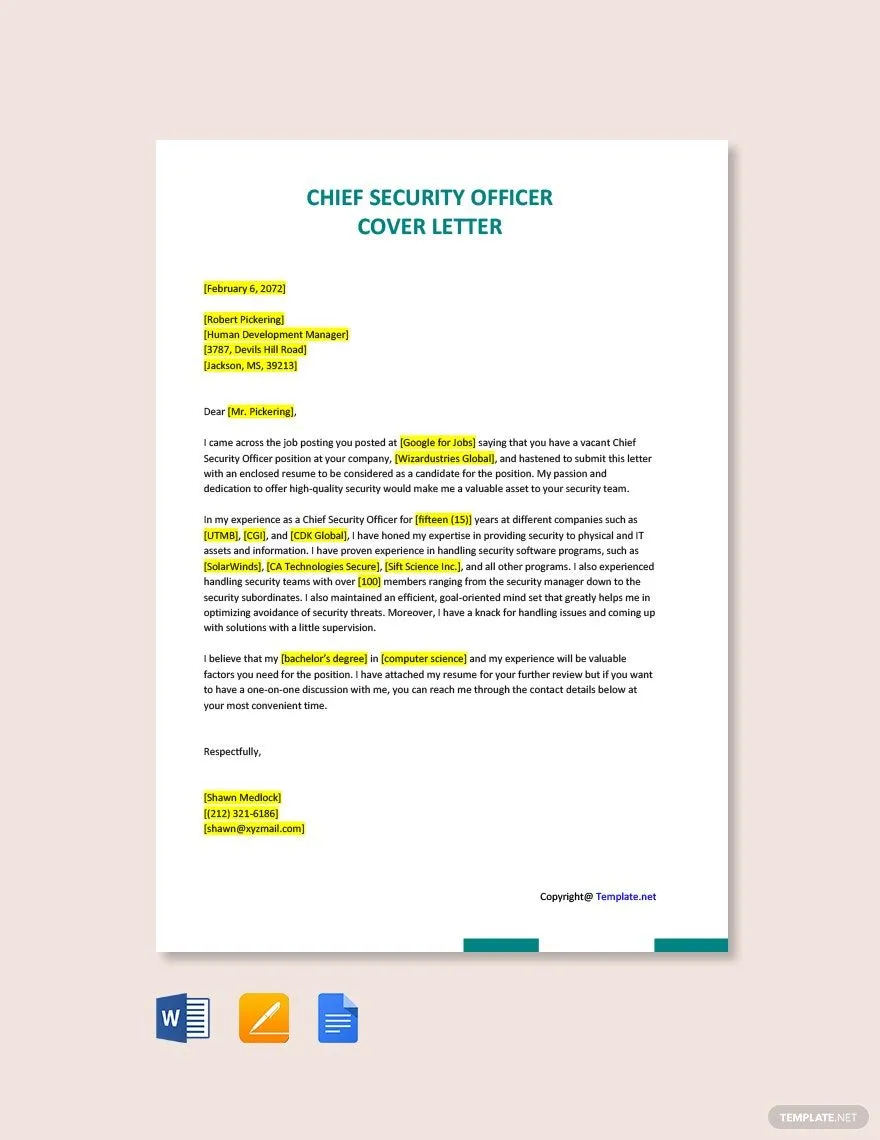
Show the employer that you understand their needs and what they are looking for in a security officer. Research the company to understand their mission, values, and the specific requirements of the role. Tailor your cover letter to demonstrate how your skills and experience will benefit their organization. Show them that you’re not just looking for a job but that you are specifically interested in their organization. By addressing their needs, you increase your chances of being considered for the position, showing that you are a good fit.
Expressing Enthusiasm and Interest
Show your enthusiasm for the position and the company. Express your genuine interest in the security officer role and explain why you want to work for them. Make sure your enthusiasm is genuine, and avoid generic phrases. Mention what specifically interests you about the role or the company. By showing enthusiasm, you make a more memorable impression and demonstrate your eagerness to contribute. Use action verbs and positive language to express your passion for security.
Call to Action and Closing
In your closing paragraph, include a call to action. State that you are eager to discuss your qualifications further and that you are available for an interview. Thank the hiring manager for their time and consideration. End with a professional closing, such as “Sincerely” or “Best regards,” followed by your full name. Providing a clear call to action makes it easy for the employer to know what the next step is. Ensure your contact information is included so that the recruiter or hiring manager can easily get in touch with you.
Cover Letter Formatting and Style
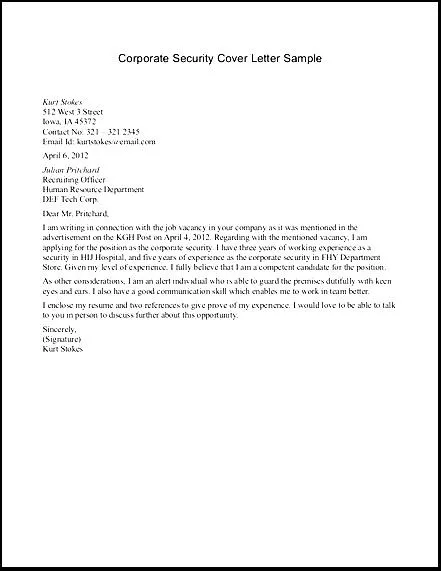
The formatting and style of your cover letter are essential to creating a professional image. Use a clear and easy-to-read font, such as Arial or Times New Roman, and maintain consistent formatting throughout the document. Pay attention to the layout, spacing, and overall appearance of the letter. A well-formatted cover letter shows your attention to detail, which is a vital quality in a security officer. Your letter’s format speaks volumes about your professionalism and commitment to excellence.
Formatting Tips
Keep your cover letter concise, ideally one page long. Use single spacing within paragraphs and double spacing between paragraphs. Use left alignment and avoid justified text. Break up large blocks of text with bullet points and short paragraphs to improve readability. Use bolding to emphasize key points, but avoid overusing it. These formatting tips help to ensure your letter is easy to read and visually appealing, thus making it more likely that the hiring manager will thoroughly review your qualifications.
Proofreading and Editing
Proofread your cover letter multiple times to catch any typos or grammatical errors. These errors can create a negative impression and undermine your professionalism. Read your letter aloud to check for any awkward phrasing or unclear sentences. Ask someone else to review your letter for a second opinion. Pay special attention to names, dates, and contact information. Thorough proofreading shows that you pay attention to detail, a crucial skill for a security officer.
Cover Letter Examples and Templates
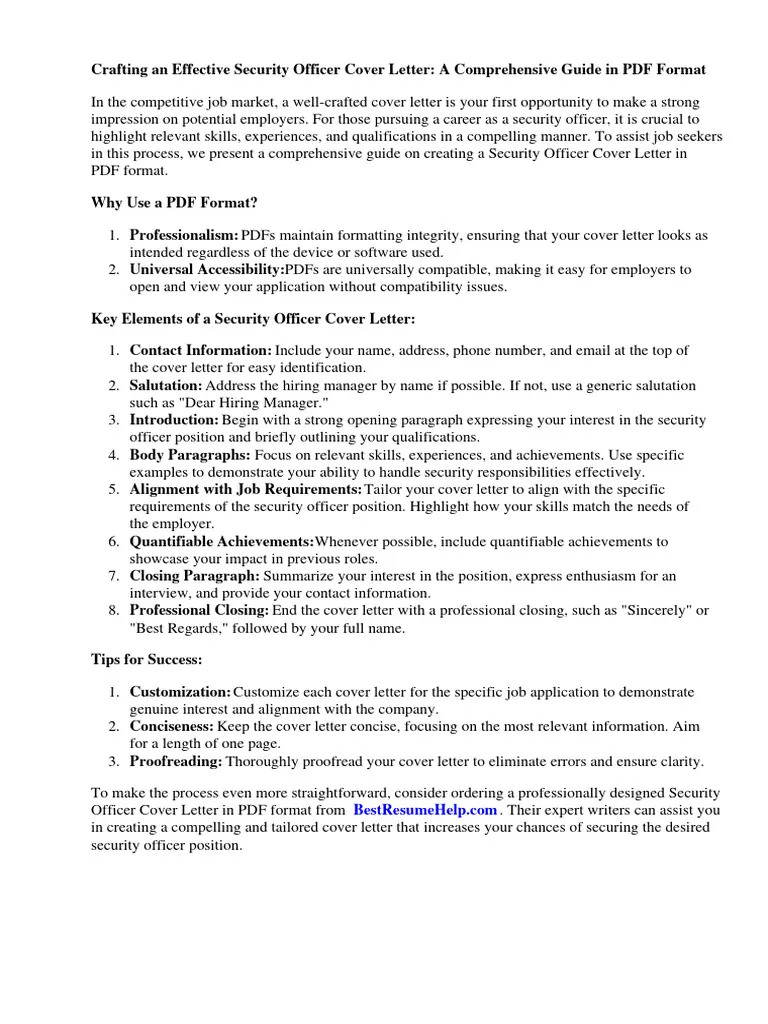
Using a cover letter example or template is a great way to get started. However, remember to personalize the example to fit your specific skills and experience. There are many templates available online, but you need to customize them to reflect your experiences and the specific job you are applying for. Review multiple examples to get a sense of the various formats and writing styles. Use these resources as a guide, but never submit a generic cover letter. Tailoring is key for making your cover letter effective.
General Security Officer Cover Letter Example
A general cover letter example should highlight your core skills and experiences, such as your experience in patrolling, monitoring surveillance equipment, and incident reporting. Customize a generic example by adding details specific to the job you are applying for. Highlight your skills and achievements by including metrics, such as any improvements to safety protocols and how these improvements reduced incidents. Make sure it speaks about why you are a good fit for this particular role and company. An effective general cover letter demonstrates your capability to perform essential security duties.
Example Cover Letter for Specific Security Roles
If you are applying for a specialized security role, tailor your cover letter accordingly. For example, if you are applying for a role that requires experience with access control systems, highlight your expertise in this area. If the role requires experience in a particular industry, such as healthcare or retail, mention your relevant experience in those sectors. Customization shows you are attentive to what the employer is looking for. Tailoring your application to the specific job shows that you are a strong candidate for the specific role.
Common Mistakes to Avoid
Avoiding common mistakes can significantly improve your chances of getting an interview. Pay close attention to details and ensure that your cover letter is polished and professional. The small details often make the biggest difference. These mistakes often lead to immediate rejection of the application. Be mindful, and remember to always review the application and job description thoroughly before submitting.
Using Generic Language
Avoid using generic language and clichés. Instead of saying you are a “hard worker,” provide specific examples that demonstrate your work ethic. Use action verbs and avoid passive voice. Generic phrases will not impress hiring managers. Use clear, concise, and specific language to highlight your skills and experience. The goal is to convey your capabilities effectively and stand out from other applicants.
Ignoring the Job Description
Do not ignore the job description. Tailor your cover letter to address the specific requirements listed in the job posting. Use the same keywords and phrases used in the job description. If the job description emphasizes certain skills or qualifications, be sure to highlight those in your letter. Failing to address these specific needs means your application is likely to be overlooked, so make sure you do your research.
Typos and Grammatical Errors
Typos and grammatical errors can ruin your chances. Proofread your cover letter carefully, and have someone else review it as well. A cover letter with errors suggests a lack of attention to detail. Proofreading is critical. Use grammar checking tools, but don’t rely on them entirely. Always review and edit your cover letter yourself to ensure it is error-free. A polished cover letter will demonstrate professionalism.
Finalizing and Submitting Your Cover Letter
After writing your cover letter, it’s important to finalize it and prepare it for submission. This process includes a final review, ensuring your information is accurate, and the best format. Proper submission will demonstrate your professionalism. Following these final steps helps you increase your chances of securing an interview.
Reviewing Before Submission
Before submitting your cover letter, carefully review it to ensure accuracy and clarity. Check for any typos or grammatical errors, and make sure all the information is up-to-date. Verify that you have correctly addressed the hiring manager and that your contact information is accurate. Verify your letter aligns with the job description, and that you’ve highlighted the key points. This final review should be a mandatory step for all job applications.
Submitting Your Cover Letter
When submitting your cover letter, follow the instructions provided in the job posting. Submit your cover letter and resume as separate documents unless the instructions specify otherwise. If sending via email, include a concise subject line such as “Application for Security Officer Position.” Make sure your files are in an accepted format (usually PDF or DOCX). Follow these instructions to submit your application correctly. Ensure you are adhering to the proper protocol.
